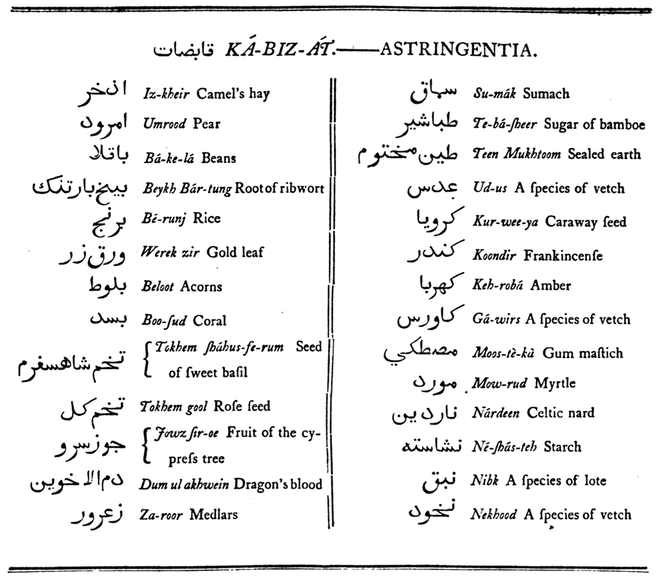Sentry Page Protection
2O. Astringents
Binding
Materia Medica in Arabic & Persian, Shirazy, 1793
These medicines were traditionally also classed as Incrassating (thickening), Repellent (repelling) or Adstringent (binding).
Astringent medicines are drying, usually in the 3rd or 4th degree. They thicken Humors and Fluids, and therefore hinder leakage. They also tighten lax tissues.
They are used for Diarrhea, Dysentery, Leukorrhea, Spermatorrhea; some restrain Sweat and Excessive Urination. Some have a secondary tonic action and help stop loss of Essence. Some are also Hemostatic, or hinder Miscarriage.
They are known by their astringent and contracting effect on the tongue when they are tasted.
They are opposed to Loosening, Lenitive and Opening medicines.
Compare with the TCM classification of R. Astringents
Astringent medicines are drying, usually in the 3rd or 4th degree. They thicken Humors and Fluids, and therefore hinder leakage. They also tighten lax tissues.
They are used for Diarrhea, Dysentery, Leukorrhea, Spermatorrhea; some restrain Sweat and Excessive Urination. Some have a secondary tonic action and help stop loss of Essence. Some are also Hemostatic, or hinder Miscarriage.
They are known by their astringent and contracting effect on the tongue when they are tasted.
They are opposed to Loosening, Lenitive and Opening medicines.
Compare with the TCM classification of R. Astringents
Addendum:
Anhydrotics–Medicines that Stop Sweating
Anhydrotics–Medicines that Stop Sweating
Others:
Jaborandi
Externally: rub oil over the body; wash the body with Vinegar; Starch as a dusting powder
Jaborandi
Externally: rub oil over the body; wash the body with Vinegar; Starch as a dusting powder
Western Classification

